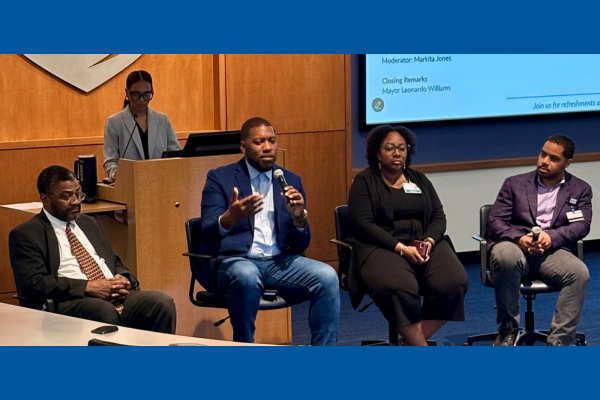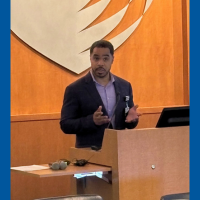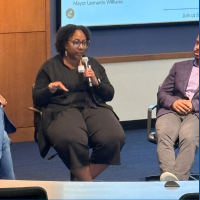
The Duke Orthopaedics Trauma Division recently hosted a timely and informative panel discussion focused on preventing gun violence in Durham. The event brought together voices from healthcare, academia, and local government to explore the root causes of gun violence and identify actionable solutions.
Panelists included:
- Dr. Malcolm R. DeBaun, MD, Trauma Surgeon at Duke Health
- Uzuri Holder, LCSW, Project Manager for Duke’s Violence Recovery Program
- Dr. Jonathan N. Livingston, Interim Chair and Professor of Psychology at North Carolina Central University
- Leonardo (Leo) Williams, Mayor of Durham

Dr. DeBaun opened the event by sharing a deeply personal story about treating a teenage gunshot victim who was afraid to return home. “I felt helpless,” he said. “That look of fear stuck with me. I wanted—and needed—to do something to prevent this from happening to other kids.” His experiences in the operating room and conversations in local barbershops inspired the Durham Impact Project, a community-driven initiative supported by Duke Orthopaedics, Johnson & Johnson MedTech, Slice 325, and the City of Durham.
Mayor Williams highlighted the stark disparities within Durham’s school system, describing a “fiscal dichotomy” where some schools lack basic infrastructure while others thrive within the same city. “We’re correcting 100 years of issues,” he said, emphasizing the need for systemic change.
Uzuri Holder addressed the psychological toll of poverty and systemic inequity. “If I’m just trying to survive today, how do I think about tomorrow?” she asked, calling for honest conversations about the societal structures that perpetuate violence.
Dr. Livingston pointed to the cultural normalization of violence in media and entertainment. “Violence is an act every 60 seconds in music, TikTok, cartoons, television, and video games,” he said. “This is what young people are absorbing—it shapes their worldview.”

The panelists agreed that collaboration is key. Mayor Williams noted that many groups are working in silos: “Only when frustration and inspiration collide does it move the needle.” He highlighted the newly launched Bull City Future Fund, which supports local organizations like Sidekicks Academy, the Durham YMCA, and the Youth Mentoring Collaborative.
Dr. DeBaun proposed leveraging trusted community spaces—like barbershops and beauty salons—as hubs for outreach and mentorship. Panelist Holder agreed and added, “The barbershop is therapeutic.” “It’s a place of trust, learning, and safety. You need 1,500 hours of training to become a barber, but only a few to own a gun.”
The event concluded with a shared commitment to continue the conversation and build sustainable, community-led solutions. As Dr. DeBaun emphasized, “Trust is at the heart of what we do. We’re going to work together—at the community level, the policy level, and the leadership level.”